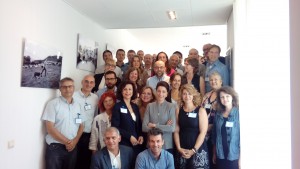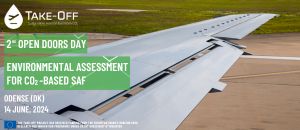On 4-5 July 2017, the 26 partners involved in the EU funded research project MAGIC held their kick-off meeting at the Copa-Cogeca secretariat in Brussels. Led by the Greek Centre for Renewable Energy Sources and Saving (CRES), this 4-year project aims at promoting the sustainable development of resource-efficient and economically profitable industrial crops grown on marginal lands, considering that industrial crops can provide valuable resources for high added value products and bioenergy.
To achieve the project objective, an up-to-date database of existing resource-efficient industrial crops will be developed with information on their agronomic characteristics, input requirements, yield performance and quality traits for end-use applications.
 A Decision Support System (DSS) will be developed and validated with the active involvement of farmers and end users. In parallel, current and future marginal lands in Europe facing natural constraints will be mapped, characterised and analysed to provide a spatially explicit classification that will serve as a basis for developing sustainable best-practice options for industrial crops. The most promising crop species will be identified taking advantage of the profound experience of the consortium and in a multi-actor approach with stakeholders. Further investigation actions include the creation of new breeding tools and strategies towards better crop varieties, the identification and optimization of appropriate agronomic practices with limited input requirements and the development of suitable harvesting strategies and logistics to optimise the biomass supply-chains.
A Decision Support System (DSS) will be developed and validated with the active involvement of farmers and end users. In parallel, current and future marginal lands in Europe facing natural constraints will be mapped, characterised and analysed to provide a spatially explicit classification that will serve as a basis for developing sustainable best-practice options for industrial crops. The most promising crop species will be identified taking advantage of the profound experience of the consortium and in a multi-actor approach with stakeholders. Further investigation actions include the creation of new breeding tools and strategies towards better crop varieties, the identification and optimization of appropriate agronomic practices with limited input requirements and the development of suitable harvesting strategies and logistics to optimise the biomass supply-chains.
The impact of MAGIC will be maximized by integrating sustainability aspects (covering environment, society and economy) of the value chains. Success stories of industrial crops in EU regions will be analysed addressing technical, environmental, economic and social issues to produce policy recommendations and best-practice guidelines for their promotion at local/regional level. The project results, database, maps and the DSS tool will be used as dissemination tools to increase farmers’ awareness and establish strong links with EIP AGRI.
 Project partners
Project partners
The project comprises 25 partners, of which 38% are SMEs and large enterprises and the remaining 62% are universities and research institutes. The research consortium is being managed by the Centre for Renewable Energy Sources and Saving (CRES).
Institutes and universities include CRES (Greece), the University of Bologna (Italy), Wageningen Research and Wageningen University (The Netherlands), the University of Hohenheim (Germany), INRA (France), Imperial College (UK), the University of Catania (Italy), the University of Lisbon (Portugal), CIEMAT (Spain), CREA (Italy), the Institute of Natural Fibers and Medicinal Plants (Poland), the Agricultural University of Athens (Greece), Institute of Bioenergy Crops and Sugar Beet Academy of Agrarian Sciences (Ukraine), the Latvian State Forest Research Institute (Latvia) and the International Institute for Applied Systems Analysis (Austria).
Companies include IFEU (Germany), nova-Institute (Germany), ARKEMA (France), Agri-food Cooperatives (Spain), BioWarmia Bioenergy & Bioresources (Poland), BTG (The Netherlands), NOVABIOM (France), Vandinter Semo (The Netherlands) and BIOS AGROSYSTEMS (Greece).
A project website will be available soon at: http://magic-h2020.eu.
MAGIC receives funding from the European Community’s Horizon 2020 (H2020) under the grant agreement No. 727698. For more information, contact the project coordinator, Dr. Efthymia Alexopoulou, CRES, Greece via ealex@cres.gr or by telephone: +30 210 6603382,
or the dissemination manager, Dr. Stephan Piotrowski, nova-Institute, Germany, via stephan.piotrowski@nova-institut.de or +49 (0) 2233 48 14 53.
Source
MAGIC, press reelease, 2017-07-14.
Supplier
Agri-food Cooperatives
Agricultural University of Athens
Arkema
Bio Warmia Advisory Group
Biomass Technology Group BV (BTG)
bios agrosystems
Centre for Renewable Energy Sources and Saving (CRES)
Centro de Investigaciones Energéticas, Medioambientales y Tecnológicas
CREA
French National Institute for Agricultural Research (INRA)
IFEU - Institut für Energie- und Umweltforschung Heidelberg GmbH
Imperial College London
Institute of Bioenergy Crops and Sugar Beet Academy of Agrarian Sciences
Institute of Natural Fibres and Medicinal Plants, Poland
International Institute for Applied Systems Analysis IIASA
Latvian State Forest Research Institute
nova-Institut GmbH
Novabiom
Universität Hohenheim
University de Lisboa
University of Bologna
University of Catania
Vandinter Semo b.V.
Wageningen University
Share
Renewable Carbon News – Daily Newsletter
Subscribe to our daily email newsletter – the world's leading newsletter on renewable materials and chemicals










